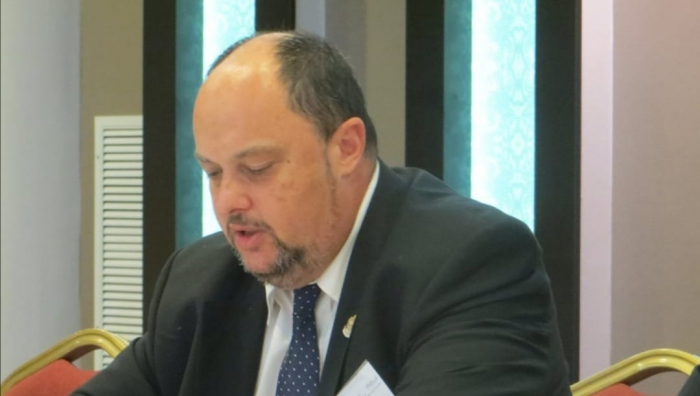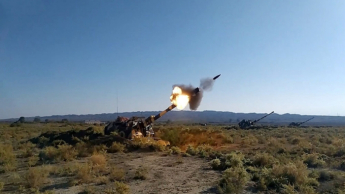George Vlad Niculescu: The South Caucasian states might be dragged into any of those European dominant scenarios for the future

Baku Tribune presents an interview with Dr. George Vlad Niculescu, head of research, the European geopolitical forum (Brussels).
Baku Tribune presents an interview with Dr. George Vlad Niculescu, head of research, the European geopolitical forum (Brussels).
- How do you think the situation around Ukraine will develop?
- The war in Ukraine is a cornerstone in European history. It is the event that crashed the post-WWII European security system. This serious security failure, which had been predictable for several years, has been completed by the escalation of the Donbas conflict into a wider Eastern European war. In a televised speech on February 24, 2022, president V. Putin portrayed that conflict as one waged against the West as a whole. He argued that the West aimed to use Ukraine as a springboard to invade and destroy Russia, which would have justified the Russian “special operation” on the territory of Ukraine aiming to protect the people in Donbas. A new European order is yet to be born, and there seems to be little appetite to imagine and negotiate it both in Russia and in the West. Meanwhile, the war will be grinding on towards unpredictable outcomes.
Different international experts have imagined various scenarios for how this war might develop over the next months or maybe a few years. According to those, it seems that the New Cold War and Regional War scenarios are the most likely futures for Eastern Europe. In contrast, the Buffer Zone scenario (Power Sharing and Limited/Controlled Stand-off between Russia and the West) is the least likely for now, as it would assume that either Russia or the West would be prepared/forced to accept a geopolitical compromise on Eastern Europe.
This is unlikely under the current Putin and Biden administrations, which seem determined to continue their geopolitical fight over Eastern Europe. A collapse of Ukraine is also hardly foreseeable within the current circumstances. On a short term, the Western Decline scenario, where European and Trans-Atlantic Unity was broken, is also hardly foreseeable, while its odds might grow as we approached the next US presidential elections. This might also change in case “Black Swan” events might lead to a breakdown of Western unity.
Indeed, at present, there are not so many chances for Ukraine ending the war with Russia in a pre-2014 territorial configuration, while Western, Russian, and maybe Chinese decisions and actions might dramatically shift in-between the Eastern European futures (described here above as New Cold War, Regional War, Buffer Zone, Western Decline) in the wake of the ongoing Ukraine war.
The South Caucasus is not immune to those unpredictable European security developments. Like it or not, the South Caucasian states of Armenia, Azerbaijan and Georgia might be dragged into any of those European dominant scenarios for the future. The unresolved or unfinished conflicts on their territories involve huge vulnerabilities that might be exploited by the ongoing great powers competition in Eastern Europe. The peaceful resolution and normalization of relations between the three South Caucasian states, as well as the strengthening of their trilateral cooperation in various regional formats, might help mitigate the serious security risks emerging from their different geographical and geopolitical positions, and the possible outcomes of the war in Ukraine, in particular those related to the possibility of the South Caucasus region being split by the “Iron Curtain” of the new Cold War.
- What do you think, will a peace treaty be signed between Armenia and Azerbaijan?
- Armenia and Azerbaijan should sign a peace treaty. However, they should not rush the negotiations, ignore the inherent political, socio-economic, administrative, security, and other obstacles ahead, and should strive to keep a prudent geopolitical balance in their deals with both Russian and EU mediators, while playing down ill-conceived suspicions about their aims and intentions. The international mediators should, on their turn, avoid the trap of misconceiving similar solutions for the Russia-Ukraine and Armenia-Azerbaijan conflicts.
They are not the same! Whereas the fresh Armenian proposals for individual and security rights aiming to shape the nature and establish the content of the status of Armenians in Karabakh cannot be implemented in a matter of months or even a few years, the proposal for a “transitional period” for Armenian-inhabited part of Karabakh to move under Azerbaijani authority, agreed upon peaceful co-habitation and mixed governance criteria, should be seriously considered.
Eighteen months after the 44-day Karabakh war, there is the feeling that the South Caucasus is barely moving towards peace and regional stability. The trilaterally signed Statement of November 10th, 2020 left open a wide range of key issues some of which have become bones of contention among the signatories and have made for “A Precarious Peace in Karabakh”, and an uncertain future of the wider South Caucasus region. At the geopolitical level, the OSCE Minsk Group was de facto side-lined on behalf of the Russian-Turkish strategic partnership over the South Caucasus, while the EU seemed interested to support demining, reconstruction, and rehabilitation, as well as related peace building efforts.
A Peace Agreement has still to be negotiated, while the normalization of Armenia-Turkey relations has achieved meagre progress. The war in Ukraine, and the ensuing Russia-West hybrid and economic wars: threatened the current geopolitical structure and arrangements in the South Caucasus possibly leading into unwanted geopolitical choices of the regional states; dimmed the prospects for cohabitation of the European and the Eurasian integration processes; started to create geopolitical roadblocks to regional cooperation and infrastructure connectivity possibly ending up into a new «Iron Curtain» around, or cutting through, the South Caucasus region.
On April 13, prime-minister Pashinyan announced a shift in Armenian policy on Artsakh by a somewhat opaque message in front of the Parliament that was decoded by Armenian experts as: “Armenia should agree to see Karabakh as part of Azerbaijan with some level of autonomy”. (https://armenianweekly.com) However, the nature and content of the autonomy, and where exactly would it be applied must still be negotiated. Many Armenians (in particular those living in Karabakh, but not only) are skeptical, if not fearful, of living in what they perceive as a politically foreign, culturally alien, and potentially security threatening Azerbaijan.
Therefore, as of May 1, regular street protests organized by the Armenian political opposition broke out aiming to hinder (or block) the negotiations on the peace treaty thereby Armenia would accept Azerbaijani sovereignty over Karabakh in exchange for an uncertain autonomy to be offered to the local Armenians. For now, Azerbaijani authorities generally keep quiet about the individual rights and security guarantees they might be prepared to grant to Armenians from Karabakh. This might be part of a negotiation strategy aiming to minimize their offer to strictly necessary. However, a more friendly, forward leaning Azerbaijani approach might help building confidence with the Armenians, who seem terrified by the prospects of changing their citizenship and governance system. Here, EU/Council of Europe technical mediation might be useful.
- How do you assess the prospects for Finland and Sweden to join NATO? Will they join the Alliance in the near future? What are the risks associated with their desire to join NATO?
- Finland’s and Sweden’s applications for NATO membership are quite logical in the context where the European security system that secured their neutrality has dramatically crashed in the wake of the Ukraine war. They might have thought that due to their EU membership they have a large stake in falling onto the Western side of the emerging new “Iron Curtain” of the new Russia-West Cold War. NATO membership was their easiest way to achieve that goal. Most European and the American members of NATO whole heartedly supported their call for membership. Both countries had met for many years all the necessary criteria for acquiring NATO membership, as per the NATO Enlargement Study dating back from 1995.
What was missing was the political will of the leaders and populations of both countries to join NATO, as they had seen so far, NATO’s Partnership for Peace program as good enough for protecting their security. The war in Ukraine has rapidly shifted that perception towards a stringent need for NATO’s article 5 security guarantees, as they feared that what was now happening to Ukraine might at some point in the future happen to them as well. Those fears have dramatically increased due to the growing strategic and geopolitical importance of the Arctic region, where they felt threatened by what they saw as Russian and Chinese raising interests and ever bolder incursions.
Although there is some opposition against Finland’s and Sweden’s NATO membership from Russia and from Turkey those might only delay, but not completely stop the process of acquiring NATO memberships. Russia understands that the small Finnish and Swedish armed forces would not significantly change the balance of military power at the borders of Western Russia. However, in case new NATO infrastructure or weapons were deployed on the territories of the two Nordic countries then the Russian security threat perception might change.
For now, Moscow understands that this is part of the geopolitical costs to be paid for running its war in Ukraine. On the other hand, Turkey’s opposition is hardly strategic or principled. President Erdogan might have expected to bargain with the two aspirant countries as well as with the US Ankara’s necessary approval of this round of NATO enlargement. Given Turkey’s opposition is political, I’m quite confident that a political compromise would be found to satisfy the basic interests of Ankara, on the one hand, and Stockholm, Helsinki, and Washington, on the other hand.
Interviewed by Seymur Mammadov
The Rocket and Artillery formations of the Azerbaijan Army conduct live-fire exercises in accordance with the combat training plan for 2021, the Ministry of Defense of Azerbaijan told Baku Tribune.
LAST NEWS






.jpg&h=67&w=67&zc=1&q=100)













